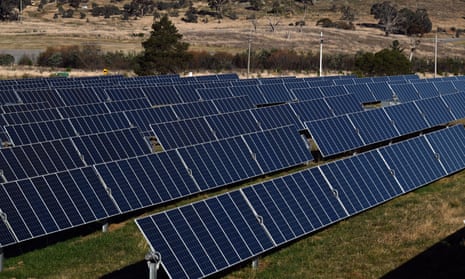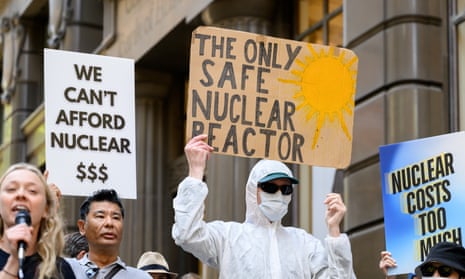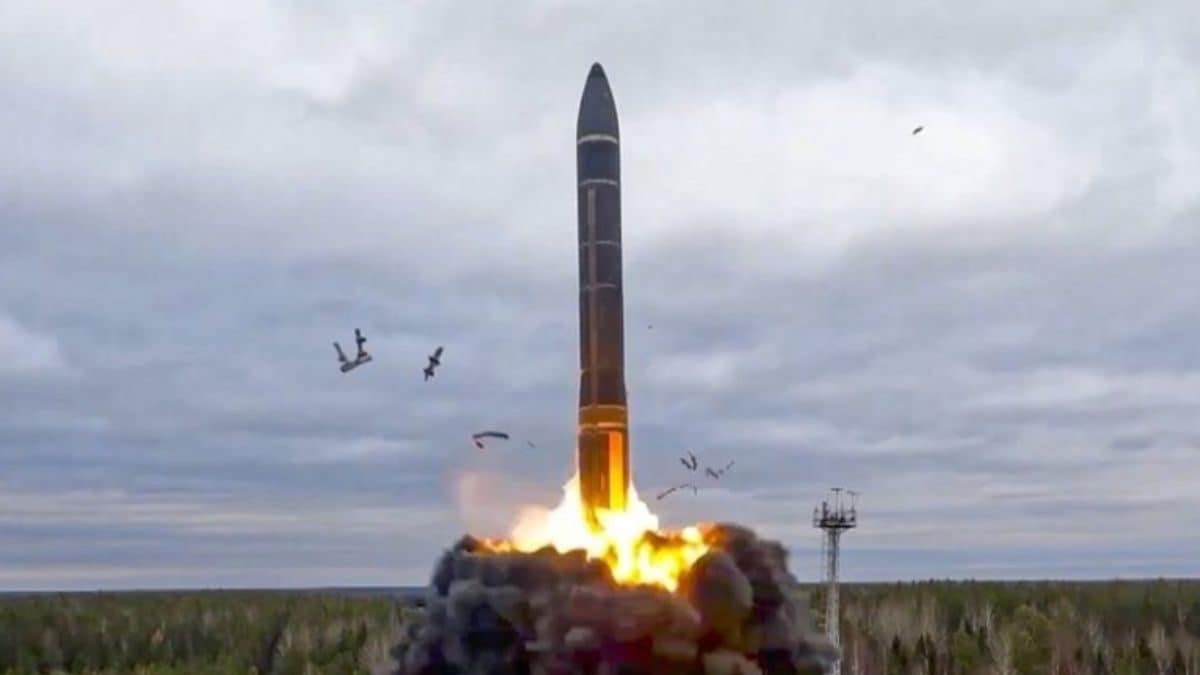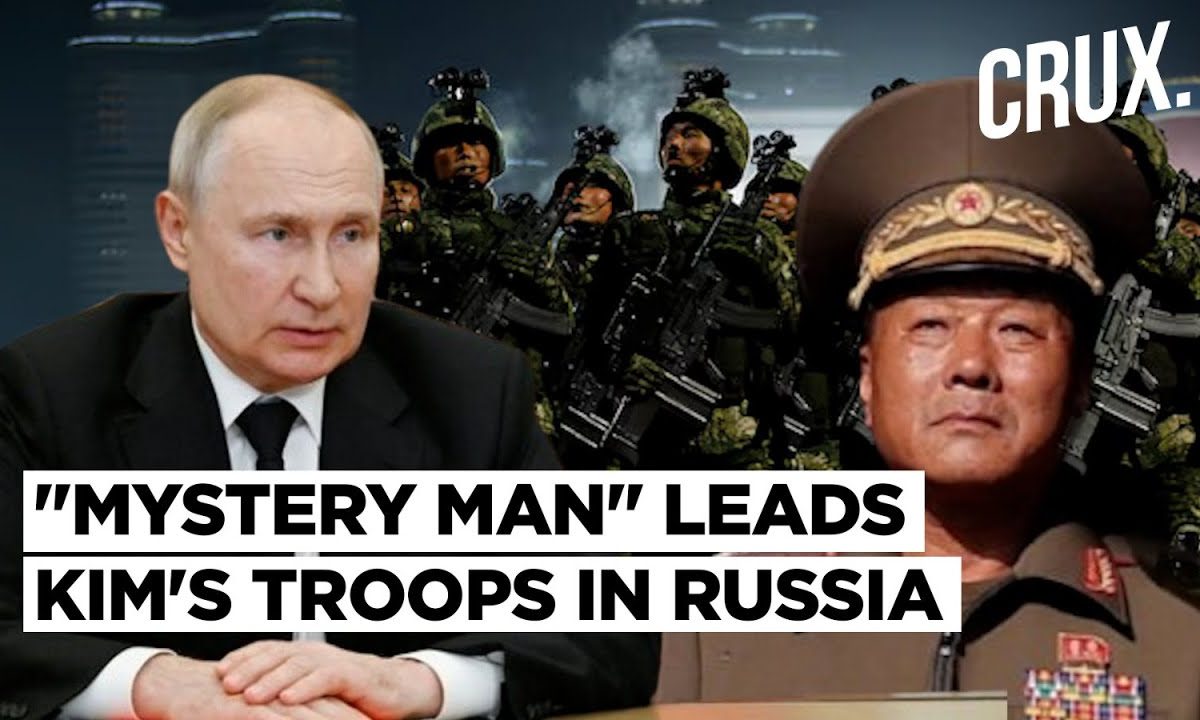Dutton says costings of nuclear power plan coming ‘in due course’
Peter Dutton has been detailing the Coalition’s nuclear power plan, but still hasn’t announced the cost – saying it is coming “in due course”.
Our nuclear plan requires a significant upfront cost, and you can look at the international examples to see as much. But a whole new and vast transmission network and infrastructure won’t be needed under the plan that we’re putting forward …
We’ll release our costings in due course, at a time of our choosing. I know Chris Bowen believes he’s running this debate, but he’s not, and we’ll provide more detail on many elements …
And just as we were upfront about the locations of our nuclear sites – and as we’ve seen in the debate so far, the government hasn’t been able to dispute those seven sites that we’ve put forward – we’ll have more information about the cost of nuclear, we’ll have it in good time. It will be independently verified, and it will show a cost differential, which is significant in favour of nuclear coming into the mix.
Key events Show key events only Please turn on JavaScript to use this feature
Taking a final question, an audience member asked: Why does the Coalition believe that nuclear is going to have less of a social license problem than renewables?
Peter Dutton responded by talking about the debate itself:
I think this debate has progressed incredibly successfully in a short period of time. The government tried to run the safety issue to start with, I think Malinauskas and others slapped them down. And we come now to a cost discussion, which is a very worthy discussion. But the international experience is going to mean that we can deliver it more cheaply here, and we can learn in a way that’s going to underpin our economy.
The Coalition has not yet released the cost involved with its nuclear policy, as we mentioned earlier – Dutton said this would be released “in due course.”
For more context on the question of cost, you can have a read of this piece from Graham Readfearn below:
Dutton: Labor’s power policy driven by fear of losing ground to the Greens
Peter Dutton argued that the government is “more concerned about the domestic impact” of policy and “whether it’s going to drive people from the Labor party to the Greens.”

And the threat in Anthony Albanese’s seat is not from us. The Liberal Party won’t win Grayndler. He’s dead worried about the Greens because the Greens hold the local council divisions, they hold the state government seat, and they’re worried desperately about losing seats like that to the Greens, and unfortunately, our national interest is running second.
Dutton: In wake of Aukus deal, why not have a domestic nuclear industry?
Asked why previous Coalition governments didn’t pursue nuclear energy, Peter Dutton argues that it wasn’t possible before the Aukus deal.
We sought bipartisan support from the Labor Party. We were never – obviously – going to get it from the Greens, but we sought it from the Labor party because that was part of our negotiation with the US. And I don’t think the US would have signed up to Aukus without their being a bipartisan position.
And therefore, if under Aukus, you’re saying that nuclear technology is safe for submariners to sleep alongside and for those submarines, as I said before, to come into Australian ports, to be within a stone’s throw of residential housing and populations of Australians … If you have signed up under Aukus to dispose of waste at end-of-life, you have made a decision that it is safe to do so. And therefore, why not a domestic nuclear industry?
Holding up Ontario as model for power policy more than a little ‘bizarre’
Just back to that Ontario example that was raised: our own Graham Readfearn has examined Peter Dutton’s claims of cheap power prices there.
Prof Mark Winfield, a sustainable energy expert at Ontario’s York University, says he finds “the notion of holding Ontario up as a model for electricity and climate policy more than a little bizarre”.
For the full details, you can have read below:
Dutton called on to prove nuclear power cheaper than renewable energy
Another audience member asks Peter Dutton to provide “quantitative evidence” to back up the claim that nuclear power will deliver lower prices than renewable energy.

Dutton says that when you look at international examples, “you can see the cost per kilowatt … you can see the end cost … you can see where the research and development money is going, and that’s that’s the reality of it”.
Dutton claims per unit cost of nuclear ‘cheaper’ over time
An audience member asks how much debt Ontario took on to develop a nuclear industry?
Peter Dutton replies that when it comes to Ontario, you need to “look at the user price today”.
I think when you look at it on a comparable basis, we can look not just to the United States and to Europe [but also to] Asia and elsewhere, and if 19 of the top 20 economies in the world are on this pathway, we’re the only one, then I think your questions around costs [are] dealt with.
Uhlmann notes that in terms of debt, “we’re looking at something between 250 billion and half a trillion dollars”. Dutton responds:
I’m not going to the figures now … but the fact is that you end up with a much cheaper per unit cost under nuclear over time …
Dutton claims South Australian premier ‘fully signed up’ to nuclear
Peter Dutton is now taking questions from moderator Chris Uhlmann from Sky News.
He is asked about the fact nuclear energy is illegal not just at a federal level, but also at the state level, and how this might be navigated.
Dutton claims the South Australian premier Peter Malinauskas is “fully signed up to nuclear” and says:
The only reservation Peter Malinauskas has expressed about nuclear is in relation to cost, and I believe that we can deal with those concerns.
Dutton says his nuclear plan is ‘truly visionary’
Peter Dutton is wrapping up his speech, and told the conference:
We can’t switch nuclear power on tomorrow, even if the ban was lifted overnight. Like other countries, we need to ramp up our domestic gas production in the more immediate term to get power prices down and to restore stability to our grid. But what we can do is also ensure that Australia doesn’t miss the nuclear train.
The opposition leader said the Coalition’s desire to see Australia become a nuclear-powered country is “in our national interest” and claimed the policy is “truly visionary, and it’s a policy unlike any put forward by a political party this century”.
Dutton says costings of nuclear power plan coming ‘in due course’
Peter Dutton has been detailing the Coalition’s nuclear power plan, but still hasn’t announced the cost – saying it is coming “in due course”.
Our nuclear plan requires a significant upfront cost, and you can look at the international examples to see as much. But a whole new and vast transmission network and infrastructure won’t be needed under the plan that we’re putting forward …
We’ll release our costings in due course, at a time of our choosing. I know Chris Bowen believes he’s running this debate, but he’s not, and we’ll provide more detail on many elements …
And just as we were upfront about the locations of our nuclear sites – and as we’ve seen in the debate so far, the government hasn’t been able to dispute those seven sites that we’ve put forward – we’ll have more information about the cost of nuclear, we’ll have it in good time. It will be independently verified, and it will show a cost differential, which is significant in favour of nuclear coming into the mix.
Nuclear power: Germany shut its remaining plants in April 2023
Peter Dutton has been speaking about a number of international examples of nuclear policy, and – as we just mentioned – claimed Australia is the only country in the top 20 economies not using nuclear.

But that isn’t entirely true, as Adam Morton reports.
Germany, the world’s third biggest economy, shut its remaining nuclear plants in April last year, and Italy, Europe’s third biggest economy, also had a nuclear industry from the 60s, but shut its plants in 1990 after a referendum.
You can read the full article below:
Dutton says ‘it is clear’ Albanese government will not reach 2030 emissions target
Back at Peter Dutton’s speech in Sydney, he argues that “it is clear” the Albanese government won’t reach its 2030 reductions target.
Indeed, there is zero chance of the Albanese government reaching net zero by 2050, using renewables alone.
He also argues emissions are up since Labor has taken office, making the case for nuclear:
Australia is the only country in the top 20 economies that is not using zero-emissions nuclear power, or taking steps to put it into the mix.
As Dutton continues speaking, it’s worth reading this article from our environment editor, Adam Morton, looking at some of the key questions and claims being raised around nuclear:
Australian shares down, consumer staples biggest loser after ACCC action against Woolies and Coles
The Australian share market has dropped from record high levels, AAP reports, taking time to digest gains from its seven-day winning streak ahead of tomorrow’s Reserve Bank meeting.
At midday AEST, the benchmark S&P/ASX200 index was down 65.8 points, or 0.8%, to 8,144.0, while the broader All Ordinaries was down 65.5 points, or 0.78%, to 8,371.7.
The consumer staples sector was the biggest loser, dropping 2.8% after the ACCC launched legal action against Woolworths and Coles for allegedly misleading buyers about their discounts.
Woolworths shares were down 3.2% to a six-week low of $33.87, while Coles had dropped 3.4% to a two-week low of $18.565.
Dutton begins nuclear energy speech at Ceda conference
The opposition leader, Peter Dutton is speaking at the Ceda conference in Sydney about the Coalition’s nuclear energy policy.
He says that energy “isn’t part of the economy, [but] is the economy”, and told the crowd the Coalition and Labor have very different approaches:
The path Labor is on with renewables only, in my judgment, is a dangerous one for our country. Labor’s policy will cause even higher energy costs and an even more unstable grid than what we’re seeing today. Labor’s energy policy, along with its … IR and environment policies, are creating an economic perfect storm, which is having a very negative impact on the economy.
He argued that the Coalition’s energy policy is “the only” plan for cheap and consistent energy, and that the Coalition “sees renewables and nuclear as companions, not as competitors.”
So the Coalition’s policy – like many other countries, the policies that they’ve adopted – it’s for an energy mix. Renewables firmed up by gas and nuclear.
Albanese on Greens: ‘They don’t talk about the environment any more’ but ‘some extreme agenda’
Anthony Albanese was asked about the prospect of working with the Greens from minority government, if that is the outcome of the election.
He responded that he was confident he would form majority government after the next election, and criticised both the Greens and Coalition:
What the Greens are doing is they defer votes on things. What that has done is defer the rollout of public housing, which we need … If you have an amendment to legislation, move it …
Adam Bandt has changed the way that the Greens party operate. They don’t talk about the environment any more, they talk about some extreme agenda. They seek to divide and they have that in common with Peter Dutton’s Liberal party, who are always seeking division, not seeking unity or not seeking to bring Australians together.
My government is focused on making a difference to the lives of Australians each and every day.
Katy Gallagher says opposition to RBA reforms ‘all politics’
Finance minister Katy Gallagher, who is also speaking to the media in Canberra, said that the government is still committed to its RBA reforms.
The bank supports the reforms. They’re important reforms to strengthen the independence of the RBA and to ensure that it is essentially set up for the job it needs to do in the future, so we remain committed to them.
This comes as the Greens said they wouldn’t back the reforms unless the government intervened to make the RBA cut rates. Gallagher continued:
I mean, this is all politics, right, and you know, I can’t think for a reason why the federal opposition would not support strengthening the independence of the RBA, were it not for politics, and the Greens are just crazy.
Albanese says divestiture powers ‘not the solution’
On the exposure draft, Anthony Albanese was asked if he would be open to divestiture powers, as the Coalition has proposed?
He said, “it doesn’t change my mind on it”.
It is rather extraordinary that you have a Coalition, a Liberal party, in 2024, along with the Greens political party, that have the same policies of breaking up capitalism.
If Coles sells their shop, who is going to move in to the local supermarket chain? Chances are they’d be divesting towards each other. That’s not the solution. What the solution is is making sure that you have an ACCC with pumped up powers.
Albanese said that this is “not rational policy” from the opposition, and they “are putting forward thought bubbles” – turning to nuclear energy ahead of Peter Dutton’s speech this afternoon:
And we’ve seen Peter Dutton give a speech today on nuclear energy where months after he said he would come clean with how much it would cost with all of the detail, we had none of it.
I have no idea why he’s giving this speech. I assume that they locked it in the diary in advance and said we’re going to give a speech about nuclear energy … and we’ll put out the costings and do all of that, and had a look at it and said, whoops, it doesn’t add up.

 1 month ago
1 month ago
















